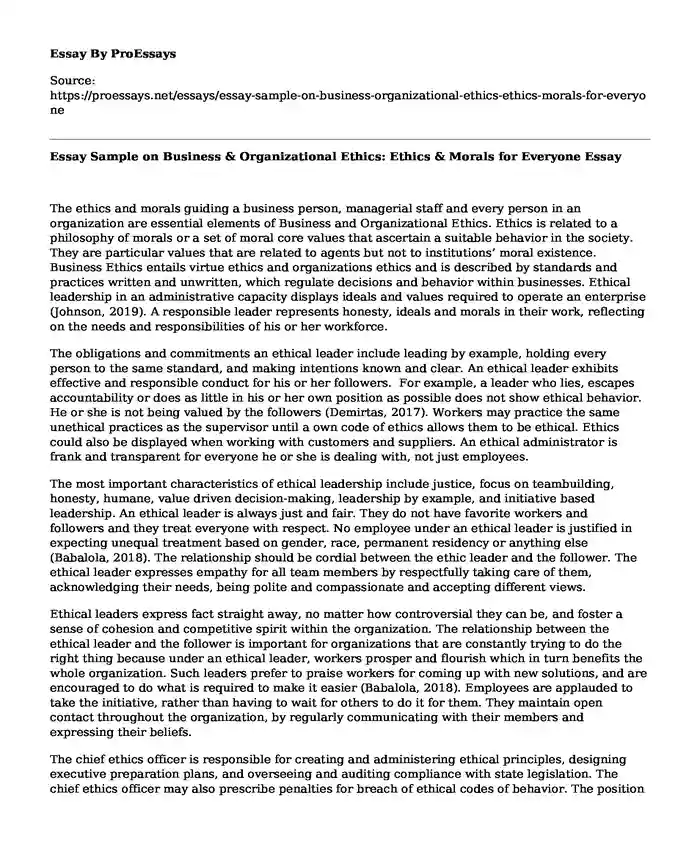The ethics and morals guiding a business person, managerial staff and every person in an organization are essential elements of Business and Organizational Ethics. Ethics is related to a philosophy of morals or a set of moral core values that ascertain a suitable behavior in the society. They are particular values that are related to agents but not to institutions’ moral existence. Business Ethics entails virtue ethics and organizations ethics and is described by standards and practices written and unwritten, which regulate decisions and behavior within businesses. Ethical leadership in an administrative capacity displays ideals and values required to operate an enterprise (Johnson, 2019). A responsible leader represents honesty, ideals and morals in their work, reflecting on the needs and responsibilities of his or her workforce.
The obligations and commitments an ethical leader include leading by example, holding every person to the same standard, and making intentions known and clear. An ethical leader exhibits effective and responsible conduct for his or her followers. For example, a leader who lies, escapes accountability or does as little in his or her own position as possible does not show ethical behavior. He or she is not being valued by the followers (Demirtas, 2017). Workers may practice the same unethical practices as the supervisor until a own code of ethics allows them to be ethical. Ethics could also be displayed when working with customers and suppliers. An ethical administrator is frank and transparent for everyone he or she is dealing with, not just employees.
The most important characteristics of ethical leadership include justice, focus on teambuilding, honesty, humane, value driven decision-making, leadership by example, and initiative based leadership. An ethical leader is always just and fair. They do not have favorite workers and followers and they treat everyone with respect. No employee under an ethical leader is justified in expecting unequal treatment based on gender, race, permanent residency or anything else (Babalola, 2018). The relationship should be cordial between the ethic leader and the follower. The ethical leader expresses empathy for all team members by respectfully taking care of them, acknowledging their needs, being polite and compassionate and accepting different views.
Ethical leaders express fact straight away, no matter how controversial they can be, and foster a sense of cohesion and competitive spirit within the organization. The relationship between the ethical leader and the follower is important for organizations that are constantly trying to do the right thing because under an ethical leader, workers prosper and flourish which in turn benefits the whole organization. Such leaders prefer to praise workers for coming up with new solutions, and are encouraged to do what is required to make it easier (Babalola, 2018). Employees are applauded to take the initiative, rather than having to wait for others to do it for them. They maintain open contact throughout the organization, by regularly communicating with their members and expressing their beliefs.
The chief ethics officer is responsible for creating and administering ethical principles, designing executive preparation plans, and overseeing and auditing compliance with state legislation. The chief ethics officer may also prescribe penalties for breach of ethical codes of behavior. The position of chief ethics officer is related to the performance of major organizations' ethics-based activities. He or she will advise staff about best practices to ensure enforcement and keep on top of legislation that affect the organization (Demirtas, 2017). If there is an ethical dilemma at any corporate level, the ethics officer can either tackle the problem or report it to the relevant party. An ethics officer will review the practices of the organization on a regular basis, and make recommendations.
Conclusion
Conclusively, an ethical leader holds the same rules and standards on everyone as his or her followers. If leaders are not transparent and hold every person to the same standards, members of the team lose respect for such leaders. He or she will lose support as the supervisor, and she or he will have frustrated workers who may fight back. This actions is not ethical and socially responsible. An ethical leader keeps the same guidelines and the same implications for all people. Business ethics and ethical leadership relate to all kinds of conduct on behalf of both people and the whole corporation. Business ethics standards allow company managers to recognize the right from wrong, and to want to do what is right. An ethical leader should be honest because followers are confident that honest and reliable leaders will benefit an organization.
References
Babalola, M. T., Stouten, J., Euwema, M. C., & Ovadje, F. (2018). The relation between ethical leadership and workplace conflicts: The mediating role of employee resolution efficacy. Journal of Management, 44(5), 2037-2063.
Demirtas, O., Hannah, S. T., Gok, K., Arslan, A., & Capar, N. (2017). The moderated influence of ethical leadership, via meaningful work, on followers’ engagement, organizational identification, and envy. Journal of Business Ethics, 145(1), 183-199.
Johnson, C. E. (2019). Meeting the ethical challenges of leadership: Casting light or shadow. SAGE Publications, Incorporated.
Cite this page
Essay Sample on Business & Organizational Ethics: Ethics & Morals for Everyone. (2023, Sep 17). Retrieved from https://proessays.net/essays/essay-sample-on-business-organizational-ethics-ethics-morals-for-everyone
If you are the original author of this essay and no longer wish to have it published on the ProEssays website, please click below to request its removal:
- Accounting Information for Financial Management - Essay Example
- Government Regulation Is Necessary To Limit Excessive CEO Compensation In The UK - Paper Example
- How These Five-Star Hotels in Morocco Can Improve on the Various Products They Offer Using Customer Satisfaction
- Paper Example on Strategic Planning in the External Environment
- Essay on HRM Powers for Smooth Operations: A Netflix Case Study
- Paper Example on Enhancing Interpersonal and Communication Skills: My Work History
- Research Paper Example on Organizational Structure: Key to Achieving Competitive Advantage







